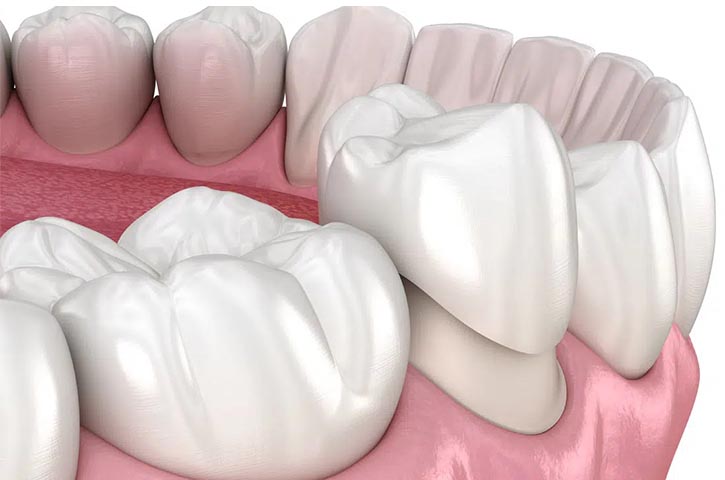Who Needs A Dental Crown?
Dental crown are a very comprehensive cosmetic treatment that will allow you to set your smile free again. It hides all the imperfections in the teeth and allows you to have the strength of your dreams. A dental crown, named after its function, is a tooth-shaped coating placed over your tooth to cover and protect it. With the latest technologies in dentistry, they are so similar to the natural tooth structure that you cannot distinguish them from natural teeth.
A dental crown may be needed in the following situations:
To cover a poorly shaped or discolored tooth to improve your smile
To protect a weak tooth from decay, breaks or cracks
To protect the restored tooth if you had a root canal treatment
To restore a broken tooth
To treat a cavity that is too large for a filling
To hold a dental bridge in position
To make a cosmetic modificatio
What Is The Dental Crown Procedure?
In our center, your dental veneers are performed in 2 or 3 sessions. The process is as follows:
In your first examination, your panoramic x-ray and photographs are taken. With X-ray analysis, it is determined whether the teeth to be veneered need filling, root canal treatment and deep cleaning. If these additional treatments are needed, they are completed first. The next step of the procedure is the veneer preparation. Your natural tooth is prepared under local anesthesia to sit on the veneer. Although it is a sensitive procedure, it is not a painful and invasive procedure. The next step is taking an impression of your teeth. Your temporary crowns are put on your teeth to protect them until your next visit. You have to be careful what you eat for a few days.
At your second visit, the temporary veneer is removed. Your new dental veneer is adjusted until your bite is perfect. Once you and your dentist are satisfied, the veneers cemented in place. The whole process takes 5-6 days.
Which Is The Best Dental Crown Material?
Compared with metal crown and metal-ceramic crown, full ceramic porcelain crown has superior properties in terms of excellent biocompatibility, transparency and aesthetic appearance. When choosing dental crown material, it is necessary to consider in which region it will be used. Recently, zirconium and e-max crowns have become popular with their superior properties.
1. Zirconia Crown
Zirconia-based restorations are frequently applied for anterior and posterior crowns and bridges. Zirconia is a radio-opaque material that does not transmit light, unlike natural teeth. Besides, it has high mechanical strength. For these reasons, they are used in posterior teeth where chewing pressure is important and there is no aesthetic requirement.
2. Monolithic Zirconia Crown
Monolithic zirconia crown is produced from zirconia blocks with CAD/CAM technology. It is resistant to breakage and crack formation. but its aesthetic performance is low because it has no light transmittance.
3. Layered Zirconia Crown
These crowns are highly aesthetic and have the ability to be used on all types of restorations. They consist of a zirconia substructure and are veneered with porcelain. The strength and accuracy of the substructure cannot be questioned as they are designed and milled on state of the art CAD/CAM systems.For all the benefits of zirconia this restoration is very flexible and offers alternatives for full mouth restorations, crowns, bridges for both anterior and posterior regions of the mouth.
4.Emax Crown
They are produced by strengthening the ceramic material used in dental treatments with special methods. With the strengthening process, it has become a material that can withstand wear for a long time. Thanks to its high light transmittance feature, it creates a very natural appearance in coating processes. This natural appearance is especially preferred in procedures where color and form changes are planned in the anterior teeth. Thanks to its sufficient durability, empress veneer treatments can be applied to back teeth and single tooth veneers. However, in treatments where the bite pressure is higher on the prosthesis, such as a dental bridge, it would be more appropriate to apply zirconium dental crown treatments to provide ideal durability.
How To Care For Dental Crowns?
Taking good care of your dental crowns extends the life of your dental crowns as well as your oral health. Here are some helpful tips:Avoid sticky and hard foods. Crowns are durable and strong, but they can still be damaged, just like your natural teeth.
Brush and floss to keep the tooth healthy.
Kick your bad habits.
Use a night guard.
How Long Do Dental Crowns Last?
The average lifespan of a well-maintained dental crown is typically around 15 years. However, when properly cared for, they can last longer. The mouth is a complex system and there are many factors that can affect the longevity of a crown, including a person’s oral hygiene, habits, and exposure to daily use. In order to prolong the life of your crown, you should keep your oral care at the highest level and carefully follow your doctor’s recommendations.


